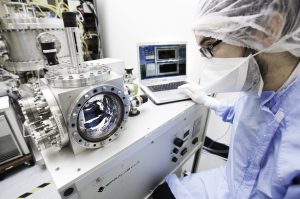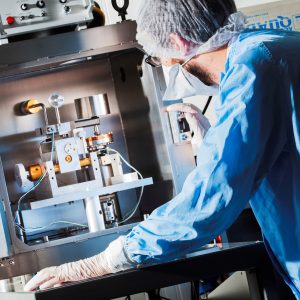Tribology – commonly described as the study of friction, wear and lubrication – is an interdisciplinary subject embracing aspects of physics, chemistry, fluid mechanics, material science, and metallurgy. For most mechanical systems, the requirements of “good tribology” and effective lubrication are to minimise adhesion, friction, and wear of the contacting surfaces and thereby to maximise life. This necessity is equally true in space as it is on-ground.
Space, however, presents a harsh and unique environment for mechanical systems, with many technical challenges for the mechanism engineer to overcome. These include a lack of moisture and oxygen, low environmental pressures, extreme temperature ranges, and strict limitations on material selection. These physical challenges, together with inaccessibility for maintenance, often long lifetime, and unacceptable consequences of mechanical anomalies or failure, emphasise the critical importance of “getting the tribology right” in space applications.
In general, the tribological solutions employed for terrestrial applications cannot readily be applied in space, and very specific, optimised space industry measures must be identified. Given this, there is an enormous desire to demonstrate and verify tribological solutions for novel space applications, to ensure that the mechanisms flying on the next generation of spacecraft can meet their tribological requirements, however demanding they may be.
Founded more than 50 years ago, ESA’s external laboratory, the European Space Tribology Laboratory (ESTL) – a centre of excellence operated on behalf of ESA by ESR Technology (UK) exists to support the industrial entities within the ESA’s Member and Cooperating states in order to ensure best practice in space tribology. ESTL offers R&D, consultancy, and hardware thermal vacuum test, together with a mature and growing new portfolio of solid lubricants and fluid lubrication services for flight hardware. All are backed by its in-house expertise and tribological knowledge.
ESTL’s support is tailored closely to its clients’ needs, and importantly, is equally accessible to new-space entities and start-ups as to long-established space industry equipment developers and primes. This support can range from straightforward tribological enquiries to more complex mechanism and tribological consultancy (“Minor Consultancy” can be provided free) including support for lubricant or material selection, evaluation and test. ESTL has produced several industry-standard handbooks and developed sophisticated modelling software which allows mechanism engineers to predict with confidence the behaviour of ball bearings.
To facilitate this support, ESTL provides access to highly specialised test facilities, several of which are globally unique. State-of-the-art vacuum tribometers allow for detailed fundamental assessment of lubricant performance. For component and mechanism level tests, its thermal vacuum test chambers can be customised to accommodate a wide range of component and mechanism type, with full environmental control and monitoring.
ESTL’s team of engineers, scientists and consultants regularly supports a wide range of spacecraft applications, including for lunar and science, telecoms, robotic, Earth Observation and other mission types.
By providing expertise, tackling challenges, rigorously testing solutions, and driving innovation, ESTL plays a critical role in ensuring the smooth operation and longevity of European spacecraft and ultimately contributing to the competitiveness of Europe’s space industry.

